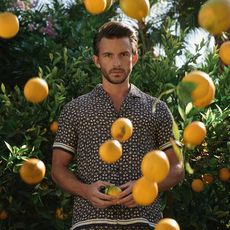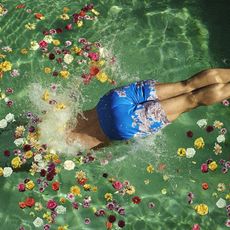Chef Elijah Holland: I spent 5 days and travelled 700km foraging ingredients to prepare for my interview at restaurant Noma
To celebrate our Botanical Capsule, we worked with the king of foragers to create a very special dish
When chef Elijah Holland, first went to meet Rene Redzepi, the founder of Noma and widely thought to be the best chef on the planet, he took quite unusual luggage. “I took 300 things I’d foraged with me. I spent four or five days, going all over the countryside, from all the way up into the mountains, and down to the coast to Canberra. I probably covered 700 kilometres, just collecting things.” His efforts paid off: Elijah Holland was soon employed by Redzepi as head forager and chef de partie.
Today, Elijah Holland is head chef at the ambitious Lûmé in Melbourne, Australia. Holland took over in January 2020 and created a menu focused on foraged food. He also has his own foraging company, Nature’s Pick. To celebrate our Botanical Capsule, Holland has created an exclusive dish for us called Where the Mountains Meet the Sea, which showcases his love of the natural world. Read on to find out how he went from teenage baker to chef superstar.
Did you always know you wanted to be a chef?
I was always going to be a chef, I think. I just love food. I started baking, when I was really young –11 or 12 – with my big brother. I wanted to make a little money and work with food. But I wanted to cook too. When I was 12, opposite the bakery was a little restaurant called Pacific Grill. I knocked on and asked them for a job and they employed me as a kitchen hand. And then after about three weeks, because I was very eager to start cooking, they put me onto the cold larder section. And I ended up being faster than the chef! I started my apprenticeship when I was about 13 and qualified as a chef at 17.
How did you become a foraging expert?
I learned a lot from my parents and grandparents when I was young. We'd go for lots of bush walks and my parents collected fennel and wild mulberries. Instead of having snacks and lollies, we chewed on sarsaparilla leaves or ate wild berries. When I started working in a kitchen, I could say to my head chef, look, I can get these extraordinary ingredients. They encouraged me.
What are the most weird and wonderful things you have found foraging?
I've been lucky enough to forage all over the world – everywhere from Canada, to the Philippines to China and New Zealand and lots and lots of places in between. It's hard to pinpoint my favourite. But here in Australia, what I think is really interesting is the beautiful seaweed we have. We have everything from tiny little seaweeds to giant things that grow to 10 meters long.
You have created a special dish for Orlebar Brown, Where the Mountains Meet the Sea, talk me through it?
I’m about to go spearfishing, in fact, to get some reef fish. I’m trying to create a dish where everything has been foraged – from the wild fish, to the seaweeds, to the flowers – from the Victorian alps to the Bass Strait coast here in Australia. I should be able to get some sea urchins, too.
What’s in the dish?
What you’re looking at is a tartare made from wild-caught reef fish with diced pickled African daisy stamens and chopped nasturtium buds. The sauce is made from hand dived sea urchins & nasturtium vinegar. The thin chips – we call them leather – are wild yams that have been pressed into the shape of flower petals. Then it’s topped with foraged flowers.
You have achieved a lot, what ambitions do you still want to fulfil?
I want to create a world where people are inspired by food. I think people have lost their connection to where their food comes from. There is this notion that you can only go to the supermarket and buy things, but the reality is that around the world some of the greatest and most nutritional foods actually come from the wild and can be foraged. Some of these wild foods could be right in our gardens.
Who is the best chef working today, and why?
I really learned a lot about the raw elements of cooking from Rene Redzepi. He's probably the greatest inspiration of my career. He really pushed me forward. He has a simplistic way of cooking. Not everything has to be 1,000 ingredients on a plate. It comes down to beautiful produce. Just incredible ingredients put together in the most perfect way
Discover how to holiday better with the latest range of mens swim shorts, a fail safe if you're looking for the perfect balance of comfort and class.


